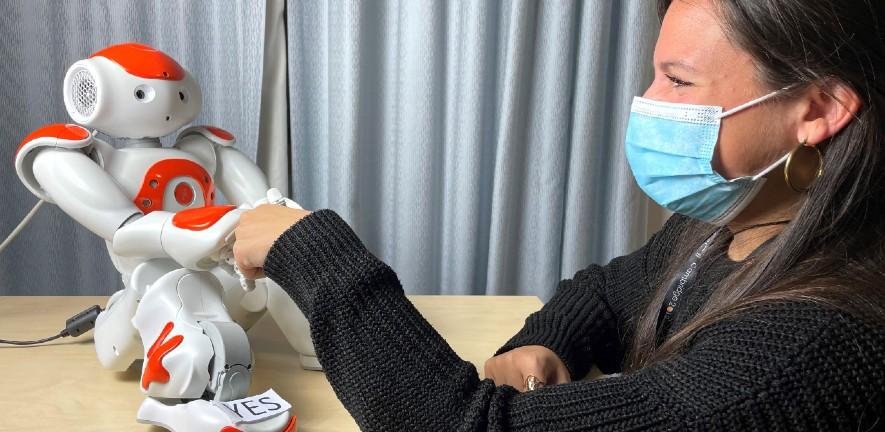
Submitted by Jane Durkin on Wed, 02/08/2023 - 14:45
Micol Spitale is a postdoctoral researcher at the Cambridge Affective Intelligence and Robotics Laboratory (AFAR Lab).
Her research focuses on different aspects of affective computing and human-robot interaction. Her postdoctoral research at Cambridge has been on developing a Socio-emotionally Adaptive Robotic (ARoEQ) platform to foster wellbeing through coaching and psychologically-proven interventions.
Micol holds a PhD from the Politecnico di Milano on the use of conversational Socially Assistive Robots (SARs) for assessing and training linguistic skills of children with Autism Spectrum Disorder (ASD).
In November 2023 Micol will start a new role as Assistant Professor working on ‘adaptive multimodal agents for wellbeing’ at the Politecnico di Milano.
Micol will be presenting at the Cambridge Language Sciences Annual Symposium on 16 November 2023 as part of a research dialogue with Oliver Lemon on speech, language and multi-modal technologies in healthcare, including human-robot interactions.
Our research at the Affective Intelligence and Robotics Laboratory sets out to understand how to design and develop robots that can aid the promotion of mental wellbeing.
In the last decade, mental health has become a real concern for the worldwide population. This has been exacerbated even more by the pandemic. However, care services cannot meet the increased demand for mental care access. Our work looks at how robots can help promote mental wellbeing, providing a new way of offering affordable and accessible mental health services.
As part of this research, we have undertaken user studies in the lab and in the real world to investigate the use of robots for mental wellbeing. This includes a collaboration with a tech company in Cambridge where we have used robotic coaches to deliver positive psychology exercises to employees.
The highlight of my career so far has been experiencing how an interdisciplinary research field such as human-robot interaction can leverage the advance in machine learning and artificial intelligence. For instance, embedding large language models in the robot can drastically improve the user experience and guarantee the success of the mental wellbeing intervention.
We recently conducted an empirical study in a tech company involving 26 employees who interacted with a robotic coach to promote their mental wellbeing. The robotic coach delivered four different positive psychology exercises over four weeks and provided their feedback on the interaction and potential of this technology.
The most stimulating aspect of my research is observing the reaction of people interacting with the robots we develop. For instance, I have a sense of pleasure when people find that the robot has a valuable effect on their mental health.
I hope that our research will lead to the adoption of new technologies such as robots that can help people in promoting their mental wellbeing even when the healthcare system cannot fulfil their demands.
My PhD research looked at the use of robots designed to help young people with language disorders, such as autism, to strengthen their language skills. Meanwhile, my postdoctoral studies have focused on robots for facilitating mental wellbeing in individuals.
‘Language and Mental Wellbeing’ is a perfect combination of these two projects. It is of paramount importance to progress the cutting-edge of robotic technology in order to have a meaningful effect on people's lives.
Photo: Nao robot shaking hands with Micol Spitale. Credit: Rachel Gardner
